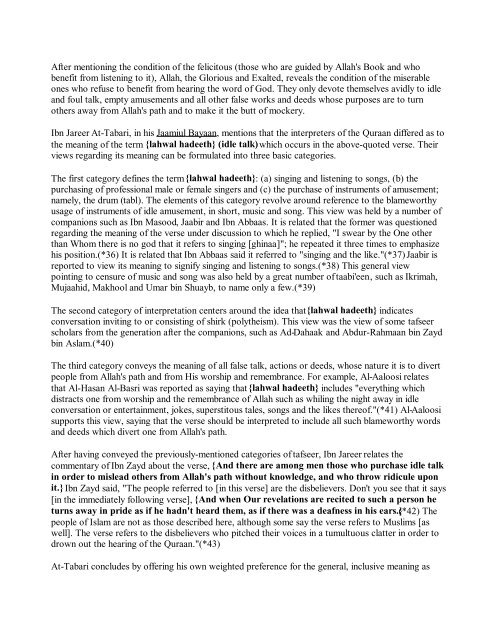The Islamic Ruling on Music and Singing - Enjoy Islam
The Islamic Ruling on Music and Singing - Enjoy Islam
The Islamic Ruling on Music and Singing - Enjoy Islam
Create successful ePaper yourself
Turn your PDF publications into a flip-book with our unique Google optimized e-Paper software.
After menti<strong>on</strong>ing the c<strong>on</strong>diti<strong>on</strong> of the felicitous (those who are guided by Allah's Book <strong>and</strong> who<br />
benefit from listening to it), Allah, the Glorious <strong>and</strong> Exalted, reveals the c<strong>on</strong>diti<strong>on</strong> of the miserable<br />
<strong>on</strong>es who refuse to benefit from hearing the word of God. <str<strong>on</strong>g>The</str<strong>on</strong>g>y <strong>on</strong>ly devote themselves avidly to idle<br />
<strong>and</strong> foul talk, empty amusements <strong>and</strong> all other false works <strong>and</strong> deeds whose purposes are to turn<br />
others away from Allah's path <strong>and</strong> to make it the butt of mockery.<br />
Ibn Jareer At-Tabari, in his Jaamiul Bayaan, menti<strong>on</strong>s that the interpreters of the Quraan differed as to<br />
the meaning of the term {lahwal hadeeth} (idle talk) which occurs in the above-quoted verse. <str<strong>on</strong>g>The</str<strong>on</strong>g>ir<br />
views regarding its meaning can be formulated into three basic categories.<br />
<str<strong>on</strong>g>The</str<strong>on</strong>g> first category defines the term {lahwal hadeeth}: (a) singing <strong>and</strong> listening to s<strong>on</strong>gs, (b) the<br />
purchasing of professi<strong>on</strong>al male or female singers <strong>and</strong> (c) the purchase of instruments of amusement;<br />
namely, the drum (tabl). <str<strong>on</strong>g>The</str<strong>on</strong>g> elements of this category revolve around reference to the blameworthy<br />
usage of instruments of idle amusement, in short, music <strong>and</strong> s<strong>on</strong>g. This view was held by a number of<br />
compani<strong>on</strong>s such as Ibn Masood, Jaabir <strong>and</strong> Ibn Abbaas. It is related that the former was questi<strong>on</strong>ed<br />
regarding the meaning of the verse under discussi<strong>on</strong> to which he replied, "I swear by the One other<br />
than Whom there is no god that it refers to singing [ghinaa]"; he repeated it three times to emphasize<br />
his positi<strong>on</strong>.(*36) It is related that Ibn Abbaas said it referred to "singing <strong>and</strong> the like."(*37) Jaabir is<br />
reported to view its meaning to signify singing <strong>and</strong> listening to s<strong>on</strong>gs.(*38) This general view<br />
pointing to censure of music <strong>and</strong> s<strong>on</strong>g was also held by a great number of taabi'een, such as Ikrimah,<br />
Mujaahid, Makhool <strong>and</strong> Umar bin Shuayb, to name <strong>on</strong>ly a few.(*39)<br />
<str<strong>on</strong>g>The</str<strong>on</strong>g> sec<strong>on</strong>d category of interpretati<strong>on</strong> centers around the idea that {lahwal hadeeth} indicates<br />
c<strong>on</strong>versati<strong>on</strong> inviting to or c<strong>on</strong>sisting of shirk (polytheism). This view was the view of some tafseer<br />
scholars from the generati<strong>on</strong> after the compani<strong>on</strong>s, such as Ad-Dahaak <strong>and</strong> Abdur-Rahmaan bin Zayd<br />
bin Aslam.(*40)<br />
<str<strong>on</strong>g>The</str<strong>on</strong>g> third category c<strong>on</strong>veys the meaning of all false talk, acti<strong>on</strong>s or deeds, whose nature it is to divert<br />
people from Allah's path <strong>and</strong> from His worship <strong>and</strong> remembrance. For example, Al-Aaloosi relates<br />
that Al-Hasan Al-Basri was reported as saying that {lahwal hadeeth} includes "everything which<br />
distracts <strong>on</strong>e from worship <strong>and</strong> the remembrance of Allah such as whiling the night away in idle<br />
c<strong>on</strong>versati<strong>on</strong> or entertainment, jokes, superstitous tales, s<strong>on</strong>gs <strong>and</strong> the likes thereof."(*41) Al-Aaloosi<br />
supports this view, saying that the verse should be interpreted to include all such blameworthy words<br />
<strong>and</strong> deeds which divert <strong>on</strong>e from Allah's path.<br />
After having c<strong>on</strong>veyed the previously-menti<strong>on</strong>ed categories of tafseer, Ibn Jareer relates the<br />
commentary of Ibn Zayd about the verse, {And there are am<strong>on</strong>g men those who purchase idle talk<br />
in order to mislead others from Allah's path without knowledge, <strong>and</strong> who throw ridicule up<strong>on</strong><br />
it.} Ibn Zayd said, "<str<strong>on</strong>g>The</str<strong>on</strong>g> people referred to [in this verse] are the disbelievers. D<strong>on</strong>'t you see that it says<br />
[in the immediately following verse], {And when Our revelati<strong>on</strong>s are recited to such a pers<strong>on</strong> he<br />
turns away in pride as if he hadn't heard them, as if there was a deafness in his ears.}(*42) <str<strong>on</strong>g>The</str<strong>on</strong>g><br />
people of <strong>Islam</strong> are not as those described here, although some say the verse refers to Muslims [as<br />
well]. <str<strong>on</strong>g>The</str<strong>on</strong>g> verse refers to the disbelievers who pitched their voices in a tumultuous clatter in order to<br />
drown out the hearing of the Quraan."(*43)<br />
At-Tabari c<strong>on</strong>cludes by offering his own weighted preference for the general, inclusive meaning as

















